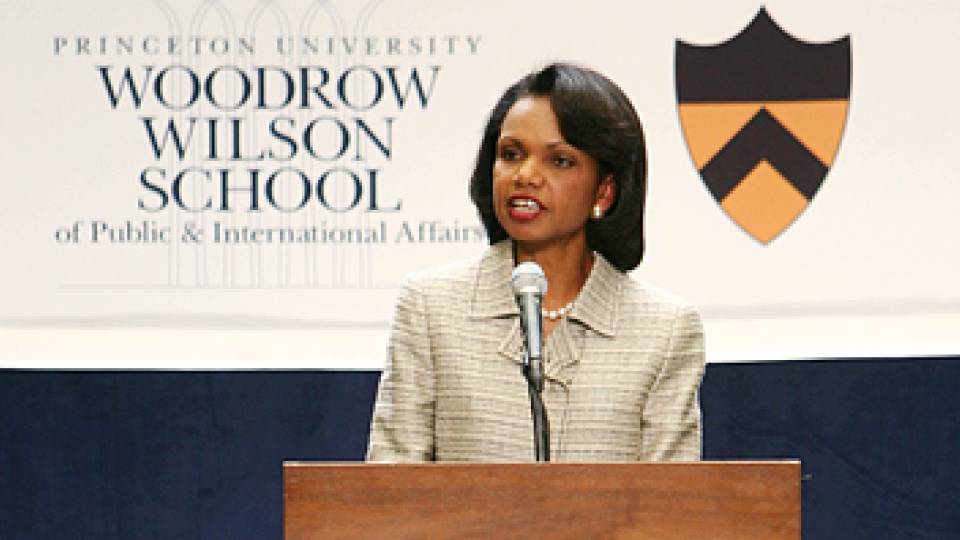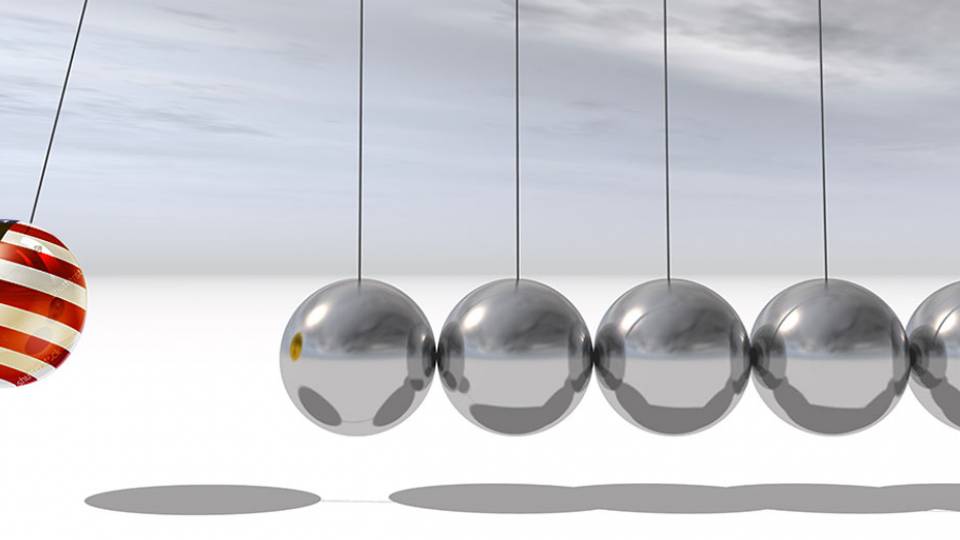From the May 7, 2007, Princeton Weekly Bulletin
In studying America's fledgling society and political institutions, the 19th-century French thinker Alexis de Tocqueville commented that Americans "appear impatient of the smallest censure and insatiable of praise." Nearly two centuries later, Princeton political scientist Robert O. Keohane has engaged fellow scholars in a study of anti-American sentiment abroad, seeking to better understand a phenomenon that has intensified Americans' anxiety about their standing in the world.
Keohane, a professor of public and international affairs, collaborated with Cornell University's Peter Katzenstein to edit "Anti-Americanisms in World Politics," which was published in December 2006 by Cornell University Press. The book presents research by social scientists from around the country examining the major forms of anti-Americanism: liberal, social, sovereign-nationalist and radical. It has garnered praise for its thorough exploration of this multifaceted problem, which Keohane said is often mischaracterized or oversimplified.
Keohane, who joined the Princeton faculty in 2005, is an eminent scholar of world politics and international institutions. He recently discussed the book and issues facing America in the international community.
How does this work clarify what you view as misconceptions about anti-Americanism around the world?
A lot of the popular discussion has confused the opposition to the war in Iraq and the Bush administration's foreign policy in general with a deep sense of anti-Americanism. It's very clear from all the evidence cited in the book that the Bush administration's policies and the Iraq war are the chief source of the very high level of anti-American feeling we see now.
In 2002, the Pew Research Center polls, which are the most comprehensive, showed that in 34 of 42 countries a plurality of respondents were favorable to America. The other eight countries included seven from the Middle East countries and Argentina, so anti-Americanism as a majority phenomenon was localized in the Middle East before the Iraq war. It's also clear from the longer-term evidence that in Europe the United States has been viewed favorably by a majority of publics almost without exception between 1957 and 2002. In Europe, 30 percent of the people in many countries reported being negative about the United States throughout much of the postwar period, but the rest reported being very positive.
Especially in Europe, favorability ratings for the United States fell sharply in 2003, around the beginning of the Iraq war, and have not recovered. Between the summer of 2002 and March 2004, according to the Pew polls, favorability ratings for the United States in Britain fell from 75 to 58 percent, in France from 63 to 37 percent and in Germany from 61 to 38 percent.
Is the popular discussion of anti-Americanism colored with too broad of a brush?
I think so. Talk that there are all these radicals out there and people who hate us is very misleading. They're quite a small minority, even in the Middle East. In 2002, people were asked a series of multidimensional questions on what they thought about American politics, higher education and popular culture. Only 5 percent of the Middle Eastern respondents were negative on all of those. Those could be considered people who are biased and just hate us. Others said, for example, American education is good, but they didn't like the American political system and they hated American foreign policy. So there was some modulation here. Even among people in societies where America is quite unpopular, there is quite a bit of modulation — and worldwide there is tremendous variation.
In the book, we make a distinction between people who dislike us because of what we are and people who dislike us because of what we do. The number of those who dislike us because of what we do has increased dramatically in the last five years. The big problem is that over time, negative portrayals can accumulate. I think the big danger of anti-Americanism is not the short-term danger of preventing cooperation with the United States, but the long-term danger that negative opinion hardens into distrust and bias. Then even a changed policy or a different approach by the United States is hard to get any leverage for. That's worrisome, especially if it becomes inculcated in the younger parts of a certain population.
Of the different forms of anti-Americanism detailed in the book, what are their characteristics? Where do you find examples of these types?
Radical anti-Americans are not only Islamic fundamentalists. If we had done this study in 1965, they would have been Marxist-Leninists. What they have in common is the view that American society is so rotten and so bad that it really needs to be transformed utterly, eliminated or at least weakened. The only people who are going to try to fly airplanes into buildings are the radicals.
The sovereign-nationalists — China is exemplary of this form — are countries that value their sovereignty and worry about the United States impinging on them. So in this case, the policy realization is these countries are very sensitive to things like flying spy planes even near their coast. If you behave imprudently or unwisely, you may force the government into more hostile actions than it wants to pursue. China right now doesn't want to quarrel with the United States, but if the United States were to bomb some Chinese site by mistake, you can certainly bet they would be under pressure to do a lot of negative things.
Looking at what we call social anti-Americanism, a lot of people around the world are not going to love the United States no matter what we do, even though they may be willing to cooperate with us and work with us. Our society is very different than theirs and reflects, in many cases, values that they have rejected. It's notable that the U.S Constitution is not much imitated, whereas South Africa's, for example, is more so in some of the new democracies. The United States is an odd country. It was one of the first republics that became a democracy, but we have a death penalty, we have a minimal welfare state, we have no universal health care. It's not a model for many of these countries. If you're a typical Swede, you're quite willing to cooperate with the United States and you may respect the United States, but it's certainly not the kind of country about which you think "we want to be like them," because you made a different choice about the kind of socioeconomic and political system you have.
Finally, for liberal anti-Americans — which seems like an oxymoron — the problem is hypocrisy. Many liberals are upset about U.S. foreign policy — this includes Americans. These Americans would be categorized as liberal anti-Americans if they lived abroad. They agree that the United States has often done very good things for the world, but now how can it possibly justify Abu Ghraib and Guantanamo?
You discuss in the book Americans' desire to be liked — has that applied historically to policy?
One reason Americans worry so much about anti-Americanism is that we still have the same characteristics that Tocqueville observed — a sort of national insecurity. We want people to love us, and when they don't we're often puzzled, angry and upset.
This is a trait of American foreign policy over a long period of time. There is a theme in American history of a desire to be helpful to the world in ways that are consistent with our own sense of ourselves and our self-esteem. The founders saw America as a city on a hill. We see ourselves as not just helping ourselves, we see ourselves as helping the world. That's true of the Declaration of Independence — it's a statement to the world.
That theme has been a positive feature of America's liberal internationalism. But we see that it has potential pathologies. Almost anything can be turned negatively, and when that desire to help the world becomes a self-righteous, moralistic and arrogant belief that we know exactly how to help the world and we can force them to be free, so to speak, then it has very bad consequences.
Do you and your colleagues offer policy recommendations to temper anti-Americanism?
This really is a book of diagnosis. What the book implies for policy is that there is a lot of space to improve the view of the United States, because it had recently been quite positive. The open question is: How much time do we have to reverse things? My own view is that if the next administration breaks with Bush administration policies — for example, in Iraq or toward climate change — this should be publicized worldwide, because we should want to have a very clear, symbolic statement that the United States is now different. You wouldn't want to emphasize continuity with the past, which you might be tempted to do for some other reasons, because this current administration is so unpopular that you want to establish that this doesn't represent America.

